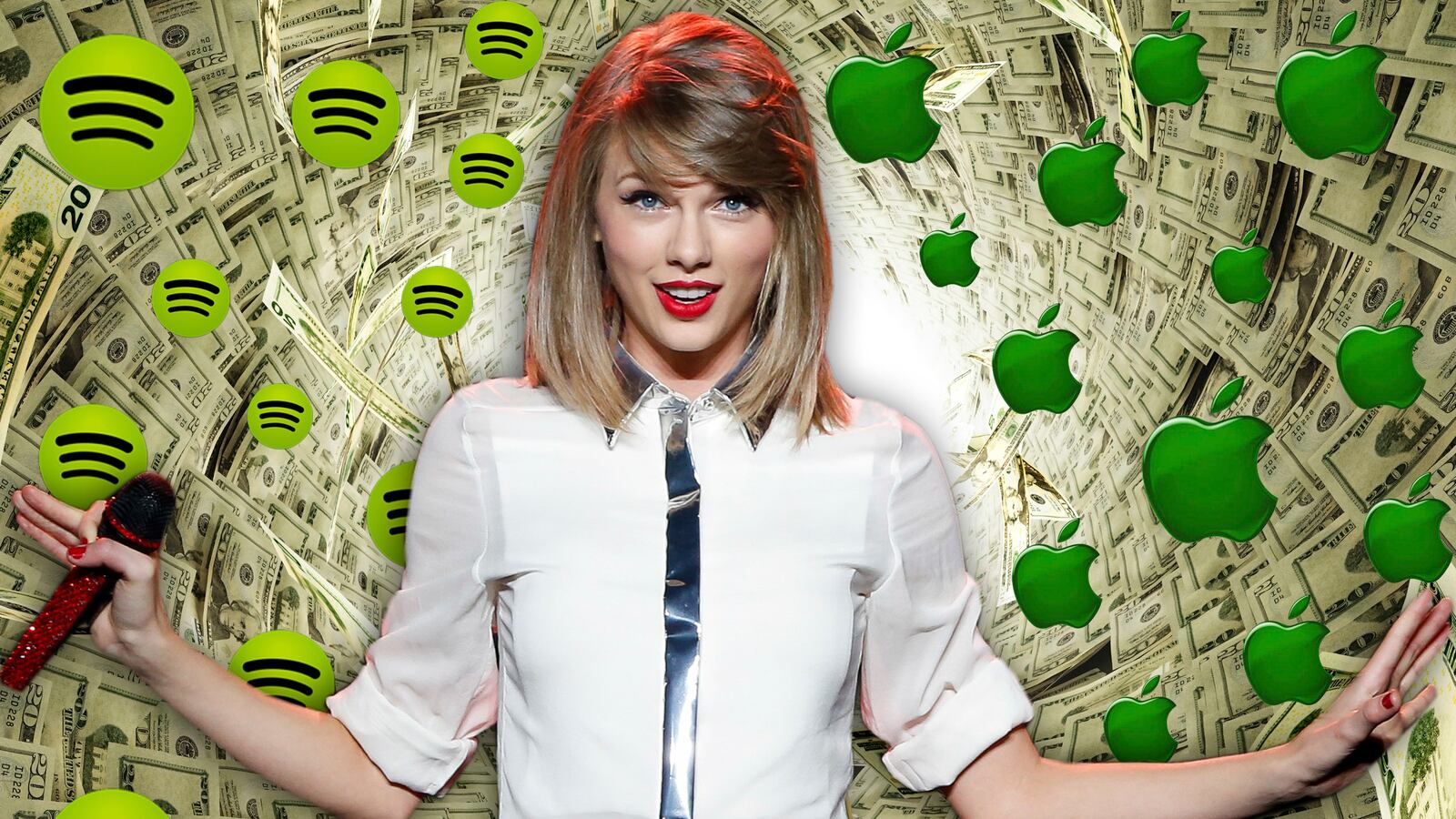Shots fired.
Taylor Swift just used a calculated business decision, cloaked in artistic integrity, to pave the way for a digital music war. The critically adored pop (née country) star removed all her music from Spotify on Monday, illuminating the impending battle between iTunes and Spotify to be the only streaming music service in town.
Sure, 1989, Swift’s new album, is not on Spotify. But it’s still up on the Apple-owned iTunes, where the singer had an exclusive agreement for the track-by-track release. And it’s also still streaming on Beats, a music service acquired by Apple this January. The $4 billion buyout by Apple came shortly after striking a deal with Beyoncé to release her 2013 surprise album only through iTunes—an album that’s still not streaming on Spotify. Allegedly, there’s a new Beyoncé album dropping on Nov. 14, and if past behavior is any indicator, it will stream only on iTunes.
“Music is such an important part of Apple’s DNA and always will be,” said Eddy Cue, Apple’s senior vice president of Internet Software and Services. “The addition of Beats will make our music lineup even better, from free streaming with iTunes Radio to a world-class subscription service in Beats, and of course buying music from the iTunes Store as customers have loved to do for years.”
Unless Spotify can figure out how to better pay artists and develop exclusive deals, this could easily spell the end for them. Swift’s was a move foreshadowed in 2012, when she was apprehensive about streaming her second album, Red, on Spotify due to its paltry royalty payments. Swift and company know how visible even these decisions are in the information age. The consumer can see every industry misstep. Or, at least we think we can—Beats can’t be paying much better than Spotify. But when “transparency is the new mystery,” as guitarist Marnie Stern once put it, we’ve never seen consumers so ethically minded. This might be the reason digital sales are becoming fewer even as physical sales, such as actual vinyl records, are on the rise again—the commodity means more. We’re playing right into Swift’s keen plans to use the separation from Spotify as an artistic decision rather than a commercial one. We need to believe that Taylor's actions yesterday are pure, or the transparency loses its potency.
The entire 1989 album cycle, from the do-what-I-want-and-damn-them ethos of lead single “Shake it Off,” to the white noise “accident” she posted to Soundcloud just a couple weeks ago, to this seemingly rash decision to pull from Spotify, this is all starting to seem too good to be true. Based on a July op-ed that Swift wrote for The Wall Street Journal, this move was baked into the 1989 business plan from the beginning.
Back then, she wrote:
“Music is art, and art is important and rare. Important, rare things are valuable. Valuable things should be paid for. It’s my opinion that music should not be free, and my prediction is that individual artists and their labels will someday decide what an album’s price point is. I hope they don’t underestimate themselves or undervalue their art.”
At best, Taylor stands by her words and can somehow be the spokesperson for everyone on Spotify, even as the company pays out the highest possible dividends without imploding. At worst, her op-ed positioned her to tell her fans just how valuable she is, using the Spotify dilemma as an opportunity to create a false demand for her music. Eric Harvey, a music and technology writer and Assistant Professor of Communication at Weber State University, wrote to me over email:
“I think what Taylor did is ‘windowing,’ a.k.a. leaving a time window where your music is only available at certain spaces—either out of fealty to one vendor or because you're wanting to avoid cannibalizing sales and achieve those blockbuster Michael Bay first-week numbers.”
If we were talking about a less visible artist like Radiohead (who also pulled their music from Spotify and sold about the same number of albums as Swift over a much longer period of time) the digital vacancy would be more noticeable. But Swift is only in her second week of 1989 and already moved a million units, according to Billboard. The absence of her music is figurative. Spotify users must now turn elsewhere to find 1989, as well as the rest of Swift’s tunes. And where are they turning? To iTunes or to Beats, both soon to be the same apparatus, one that has never had to rely on profits from music sales thanks to the cushion provided by the tech giant. This allows for artist compensation based on revenue rather than royalty, as Spotify does. It’s a safe bet for Swift, one with a soft landing and almost no risk. And one that gives her the moral high ground.
Taylor knows not only the value of her commodity, but also how to control it. This gives her again the upper hand, as she is seeking to fix a market price across all digital servicing for her work. Allowing her music to continue streaming on Spotify for less revenue would be akin to HBO charging Comcast less than Dish for their content. She knows the ethics behind this, and she wants those ethics to be visible on a broad scale.
This entire album cycle has been engineered to give Taylor the edge in business decisions by inserting a naiveté that allows her the next strata of sales without the cutthroat attitude that consumers have come to mistrust in the recording industry. Is behind-the-scenes duplicity, cloaked in coming-of-age business dilemma, the new norm for major-label moves? Her label is actually called Big Machine, so don't think I’m reaching here. Behind that coming-of-age innocence and strong-will of Swift is an intense artistic decision. As Jon Caramanica wrote for The New York Times after Nicki Minaj backed out of a Hot 97 Summer Jam show in 2012:
“The idea that art and commerce are at odds is a remnant of an old culture war: dogma presented as forward-thinking but really just protecting an outmoded status quo [...]”
If that is the case, Taylor’s move here is not only commercially savvy, but also artistically pure. 1989 is not just an emerging superstar's next record: it is a landmark of a radically shifting marketplace. Her 16 million former Spotify listeners won’t just sit there. They want to hear, even as smaller artists are just dying to be heard, drowning in the streams.






